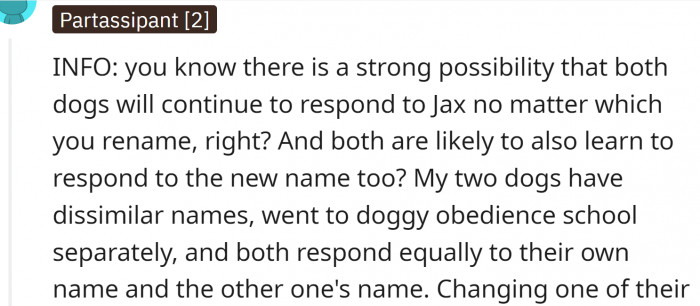Boyfriend Asks Redditor to Change Her Dog's Name or Rehome It If She Wants to Move In with Him
One of the greatest challenges of moving in together and bringing pets is learning to live harmoniously. Adjusting to the new routines, expectations, and ways of life that you and your partner must now share can be difficult.
It's important to remember that compromise and communication are key to forming a successful relationship. If you're bringing a pet into the mix, you must consider the new dynamics the animal will introduce to the household.
All pets have different needs, personalities, and behaviors, so it is essential to research before bringing one into your home. You should also consider whether you and your partner are prepared to take on the responsibility of caring for the pet.
However, there are some things you can't change. OP has been dating her boyfriend for six months, and since her lease is about to expire in two months, they've been discussing moving in together.
They both have dogs, and they are both named Jax. This could pose an issue if they move in together.
Her boyfriend suggested that one of them change their dog's name, and OP assumed her dog was safe because he is 19 years old and has become accustomed to his name. On the other hand, her boyfriend's dog is a puppy. However, he wouldn't hear of it and even said some hurtful things.
Read the full story below:
OP asks:

OP has been dating her boyfriend for six months, and since her lease is about to expire in two months, they've been discussing moving in together.

They both have dogs, and they are both named Jax. This could pose an issue if they move in together.

The Emotional Weight of Pet Ownership
Pet ownership often comes with deep emotional ties, which can complicate relationship dynamics. According to research from the University of Minnesota, individuals often form strong attachments to their pets, viewing them as family members.
This attachment can lead to conflict when partners have differing views on pet care, as seen in this scenario.
Her boyfriend suggested that one of them change their dog's name, and OP assumed her dog was safe because he is 19 years old and has become accustomed to his name. On the other hand, her boyfriend's dog is a puppy.

However, he wouldn't hear of it, and he even said some hurtful things.

OP has offered the following explanation for why they think they might be the asshole:

The psychological concept of cognitive dissonance is relevant here, as individuals may struggle to reconcile their feelings about their pets with their partner's expectations. Research indicates that this internal conflict can lead to increased stress and resentment if not addressed.
Understanding this dynamic can help both partners navigate their differing perspectives on pet ownership.
Why don't we just wait?

"There is a strong possibility that both dogs will continue to respond to Jax no matter which one you rename."

Changing names will only help humans.

Navigating Relationship Conflicts
Effective communication is essential in resolving conflicts related to pet ownership. A study published in the Journal of Social and Personal Relationships emphasizes the importance of open dialogue in addressing differing values and expectations.
When partners can express their feelings and concerns about pets, they can work together to find compromises that honor each person's perspective.
Good advice

Max and Jax are too similar.

Everyone here is partly at fault.

Experts recommend establishing clear agreements regarding pet care responsibilities. By delineating tasks and expectations, couples can reduce misunderstandings and foster a collaborative approach to pet ownership.
This proactive strategy not only improves relationship dynamics but also enhances the well-being of the pet.
They've been dating for six months...

OP shared an update:

She even said, "I like my Jax more than you anyway."

The Role of Empathy in Pet Care
Empathy is crucial in navigating conflicts related to pet ownership, allowing partners to understand each other's feelings and motivations. Research from Stanford University shows that fostering empathy can lead to more effective communication and conflict resolution.
When individuals can empathize with their partner's attachment to their pet, they are more likely to engage in constructive discussions.
Making compromises in a relationship is essential for a healthy partnership. Compromises mean both parties are willing to listen to each other’s needs and work together to find a solution that satisfies both of them.
This demonstrates that the relationship is based on mutual respect and understanding. However, it’s important to remember that there are certain red lines that should not be crossed.
These red lines represent fundamental values and beliefs that should not be compromised. This can include things like not compromising on trust, respect, and commitment, as well as any agreements made in the relationship.
It’s important to have an open dialogue with your partner to ensure that everyone is comfortable with the limits they’ve set.
One practical approach to fostering empathy is to encourage partners to share their feelings about their pets. By discussing their emotional connections and motivations, couples can deepen their understanding of each other's perspectives.
This practice can strengthen their bond and promote a more harmonious relationship regarding pet care.
Psychological Analysis
This situation highlights the emotional complexities of pet ownership within relationships. It's essential for partners to communicate openly about their feelings and expectations regarding pets to prevent misunderstandings.
By fostering empathy and collaboration, couples can enhance their relationship while ensuring the well-being of their pets.
Analysis generated by AI
Analysis & Alternative Approaches
Conflicts related to pet ownership often stem from differing emotional attachments and expectations. By fostering open communication and empathy, couples can navigate these challenges more effectively.
Ultimately, establishing clear agreements and understanding each other's perspectives can lead to healthier relationships and happier pets.



